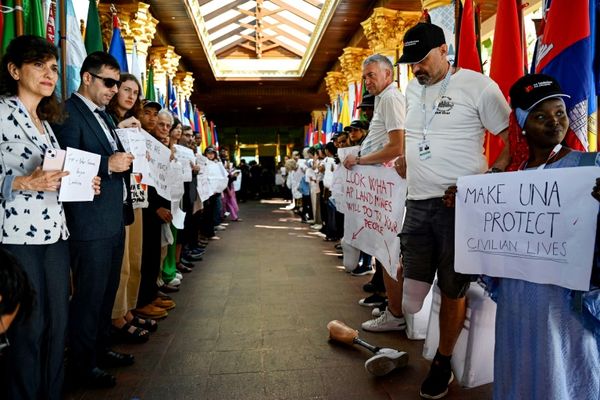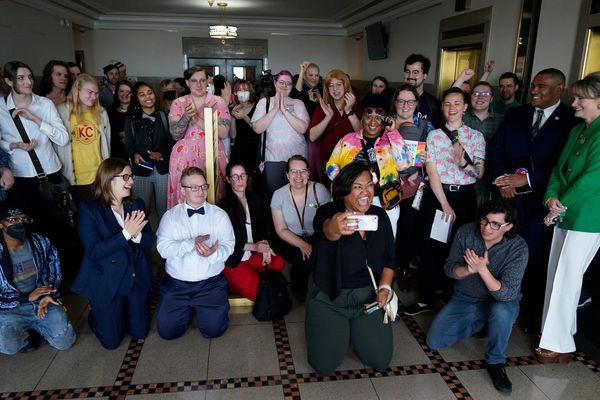The view from the window of the Almodallals’ kitchen in Rafah is nothing but rubble. Piles of debris that used to be their neighbours’ homes surround them in the al-Zuhour neighbourhood, gaping holes ripped through what remains of the walls, leaving only mounds of broken glass and concrete that crack in the silent air when people tread on them.
“We were targeted three times: To the right of our house, the left, and behind it. Now we joke that we’re next,” said Shahed Almodallal, a 21-year-old student who has spent the last four months living at her family home in Rafah, unable to return to her apartment or her university in Gaza City after both were destroyed in Israel’s bombardment of the territory.
“You feel the change living in this neighbourhood, we used to be able to hear the sounds of other people. Now in every direction there’s rubble and traces of dead bodies,” she said.
Her mother, Naima, often refuses to look out the window, appalled by the destruction, and the family have taken to sleeping at a relative’s house in fear of more strikes.
“I’ve been injured several times just standing close to the windows. We’ve tried to put plastic bags over the gaps where the windows were to keep out the rain, but this isn’t doing much,” Shahed said.
Al-Zuhour was previously designated as a safe zone by the Israeli military, she added. Amnesty International has called for several of the strikes on the neighbourhood to be investigated as war crimes.
Israeli forces have escalated strikes on Rafah, where an estimated 1.5 million people are sheltering, as officials, including the prime minister, Benjamin Netanyahu, threaten a ground invasion of the area in the coming weeks. Families such as the Almodallals say they are trapped, with nowhere else to go, despite months of desperate work by Shahed – an Irish citizen – to try to evacuate along with her parents. They have been faced with a terrible choice, to split up and leave behind her father, Walid, who is ill, or to stay together and risk death.
William Schomburg, the head of the International Committee of the Red Cross delegation in Gaza, the situation in Rafah was one of “desperation, fear and a lot of anxiety – a huge amount of uncertainty as to what’s going to happen next”.
“Just driving around on the streets of Rafah, there appears to have been a limited reduction in the number of people as they are so fearful of the situation that they’ve moved again,” he said. “Some who were previously in Rafah city have reportedly gone back to parts of the middle area, but exact numbers are hard to know. You still see tents everywhere and people crammed on the roads. The constant movement of civilians is driven in part by a chronic fear about what’s to come.
“The moment you think things aren’t going to get worse, they somehow manage to, consistently.”

Crowdfunding campaigns to raise exorbitant brokerage fees to escape to Egypt have proliferated in recent weeks as the Israeli advance into Rafah looks ever more likely. The fees are estimated at almost £4,000 ($5,000) for every adult and £2,000 per child, despite reportedly long waiting times.
After a particularly deadly night in mid-February, when Israeli forces conducted a rare operation to rescue two hostages and airstrikes killed at least 67 in Rafah, Shahed decided enough was enough.
She holds an Irish passport and both her parents have Irish visas as she is their sole carer. But the Israeli authorities have declined to add her father and mother to a list compiled by the Egyptian authorities of people approved to pass through the Rafah crossing out of Gaza.
“That morning, I just couldn’t think of anywhere to be,” Shahed said. “I thought about the border and I just deeply wanted to be safe, I could barely believe I’d managed to stay alive. We made our way to the border, and even that wasn’t easy, there were bombardments and explosions everywhere.”
She and her parents made it through the Palestinian border, but at the Egyptian crossing they were told “it is an impossible mission to accept your father”.
Walid’s health is failing, which makes leaving him behind unimaginable. The Almodallals waited all day at the crossing to see if things could change.
“It was just two steps to a safer place,” Shahed said. “At the border, we saw them reject many men. It feels like they want to separate families, that if you want to make it out alive you have to split up.”
After waiting until 10pm, Shahed said the family made a terrifying journey back to their home amid airstrikes. “We didn’t know if we’d live to the next morning. Every minute here in Gaza it feels impossible to live, it’s like a fresh battle to survive. We are still waiting, and this has thrown us into the unknown.”
Israeli authorities and Ireland’s Department of Foreign Affairs have been contacted for comment.







